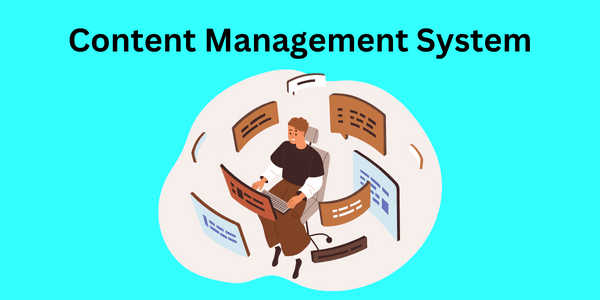Are you looking for a Website With Content Management System in 2023? With so many options available today, finding the best one that suits your needs can be difficult.
In technology, having an effective and efficient website is important. A content management system (CMS) not only helps you manage your website’s content but also gives you complete control over how your website appears.

Write an introduction for the What is a Website With Content Management System?
A website with a content management system (CMS) is a powerful tool that allows website owners to easily create, edit, and manage digital content without requiring extensive technical knowledge. With a CMS, businesses, and individuals can effectively showcase their products or services, publish blogs or news articles, create online communities, and engage with their audience.
By providing an intuitive interface for content management, a CMS allows non-technical users to take control of their website’s content and layout and easily keep it up-to-date. In this article, we will explore the concept of a website with a content management system, its benefits, and the different types of CMS platforms available today.
There are many benefits to having a website with a CMS. Here are just a few:
Easy to use: A CMS is designed to be user-friendly, even for people with little to no technical experience. With just a few clicks, you can easily add new pages, blog posts, images, and other content to your website.
Saves time: With a CMS, you can make changes to your website quickly and easily. This saves you time and allows you to focus on other important aspects of your business.
Consistency: A CMS allows you to maintain a consistent look and feel across your website. This is important for branding and helps establish a strong online presence.
Collaboration: If a team is working on your website, a CMS makes collaborating and sharing content easy. You can set up different user accounts with varying access levels, so everyone can work together without stepping on each other’s toes.
SEO-friendly: Many CMS platforms are designed with search engine optimization (SEO) in mind. This means your website is more likely to rank well in search engine results pages (SERPs), which can drive more traffic.
Many CMS platforms are available, each with its own strengths and weaknesses. Some popular CMS platforms include WordPress, Drupal, and Joomla. When choosing a CMS, it’s important to consider your specific needs and requirements. Some CMS platforms are better suited for small businesses, while others are better suited for large enterprises.
Exploring the Different Types of Popular CMS Platforms
In today’s digital world, it is important for businesses to have an online presence. A content management system (CMS) is a great way to do this as it allows you to easily create, manage, and update your website or blog.
There are many different types of CMS platforms available, each with their own strengths and weaknesses. The most popular ones are WordPress CMS, Drupal CMS, Joomla CMS, Squarespace CMS and Shopify.
Each of these platforms has its own unique features that make them suitable for different types of websites or applications. In this article we will explore the different types of popular CMS platforms so that you can make an informed decision on which one is best for your needs.
How to Choose the Right Content Management System for Your Needs
Choosing the right content management system (CMS) can be a daunting task, given the numerous options available in the market.
Here are some tips to help you select the best CMS for your needs:
- Identify your requirements: Make a list of the features you need in your CMS, such as ease of use, scalability, flexibility, security, SEO capabilities, and support for different content types like video, audio, images, and text.
- Determine your budget: CMS costs can vary widely, so you need to decide on a budget that you can afford. Remember to consider the costs of licensing, hosting, and ongoing maintenance.
- Consider your technical expertise: If you have a team of developers who can customize the CMS, you may want to opt for an open-source CMS like WordPress, Drupal, or Joomla. If you don’t have the technical expertise, you may prefer a cloud-based CMS like Wix or Squarespace that comes with pre-built templates and easy-to-use drag-and-drop editors.
- Check for integrations: Make sure that the CMS you choose can integrate with other tools and services you use, such as marketing automation software, social media platforms, and e-commerce platforms.
- Look for user reviews and ratings: Read user reviews and ratings on third-party websites like G2, Capterra, or Trustpilot to get a sense of what other users think about the CMS. Pay attention to both positive and negative reviews to get a balanced view.
- Test the CMS: Try out the CMS by creating a demo site or signing up for a free trial. This will help you get a feel for the CMS’s user interface, features, and overall usability.
By following these tips, you’ll be able to choose the CMS that best meets your needs and helps you achieve your content goals.
Choosing the Best Website CMS for Your Specific Needs & Goals
Choosing the best website CMS for your specific needs and goals is no easy task. With so many content management systems available, it can be difficult to decide which one is right for you.
It’s important to consider factors such as ease of use, scalability, security, and cost when selecting a CMS platform.
Additionally, you should also consider how well the software integrates with other services or applications you may already be using. In this article, we’ll compare several popular content management systems and provide tips on how to choose the best website CMS for your needs.
What Are The Pros and Cons Of Using A Free vs Paid Website CMS?
There are pros and cons to both free and paid website Content Management Systems (CMS). Here are some factors to consider:
Free CMS:
- Pros:
Cost-effective: As the name suggests, free CMS platforms are free of cost. It can be a great option if you are on a tight budget.
Ease of use: Free CMS platforms are often designed to be user-friendly and easy to use, making it easy for anyone to create a website without prior technical knowledge.
Community support: Free CMS platforms usually have large communities of developers, which means you can find help, resources, and tutorials easily.
- Cons:
Limited customization: Free CMS platforms often have limited customization options. You may not be able to make your website look exactly the way you want it to without advanced knowledge of coding.
Limited functionality: Free CMS platforms usually have a limited set of features and plugins available, which may limit the functionality of your website.
Security issues: Free CMS platforms may be more vulnerable to hacking attempts as they may not have the same level of security features as paid CMS platforms.
Paid CMS:
- Pros:
Advanced customization: Paid CMS platforms usually offer advanced customization options, allowing you to create a website that looks exactly the way you want it to.
Advanced functionality: Paid CMS platforms usually come with a broader range of features and plugins, which can extend the functionality of your website.
Better security: Paid CMS platforms usually have better security features, including regular updates, backups, and more.
- Cons:
Cost: Paid CMS platforms can be expensive, which may not be suitable for everyone.
Learning curve: Paid CMS platforms can be more challenging to learn and use, especially for beginners.
Limited community support: Paid CMS platforms may have a smaller community of developers, which may make it harder to find help and resources.
Ultimately, the choice between a free and paid CMS platform will depend on your individual needs and preferences. If you have technical knowledge and want advanced customization options, a paid CMS platform may be the best option. However, if you are on a tight budget and want a simple, easy-to-use platform, a free CMS may be the better choice.
7 Tips To Help You Choose The Right Content Management System
Choosing the right content management system (CMS) can be a daunting task. Here are some tips to help you make the right decision:
Determine your needs: Before choosing a CMS, identify what you need from it. Are you looking for a platform to manage a blog, e-commerce store, or a corporate website? Different CMSs offer different functionalities, so be clear on your requirements.
Consider your budget: CMSs can vary in price from free to thousands of dollars. Be sure to choose a CMS that fits your budget, but also one that offers the features you need.
Evaluate the user interface: The CMS should be user-friendly and easy to navigate. Look for a CMS that has a simple and intuitive interface, which allows you to manage your content easily.
Check for scalability: Ensure that the CMS you choose can grow with your business. Look for a CMS that can accommodate your future needs as your business expands.
Review the security features: Security is critical when managing content online. Choose a CMS that offers robust security features to protect your data.
Look for customization options: Every business is unique, and your CMS should reflect that. Look for a CMS that offers customization options that allow you to tailor it to your specific needs.
Check for compatibility: Make sure that the CMS you choose is compatible with your existing website platform, including any plugins or add-ons you may already have.
By considering these factors, you can make an informed decision and choose a CMS that meets your business needs.
Website With Content Management System examples
Here are some examples of Website With Content Management System:
- WordPress: WordPress is a popular content management system that powers over 40% of all websites on the internet. It’s open-source software that allows you to create, manage, and publish content online.
- Joomla: Joomla is another popular content management system that’s free and open-source. It’s a great option for building websites, blogs, and online stores.
- Drupal: Drupal is a powerful content management system that’s used by organizations like NASA, Harvard University, and the White House. It’s free and open-source software that’s known for its flexibility and scalability.
- Squarespace: Squarespace is a popular website builder that includes a content management system. It’s known for its ease of use and attractive design templates.
- Wix: Wix is another popular website builder that includes a content management system. It’s known for its drag-and-drop interface, which makes it easy to create and customize your website.
- Shopify: Shopify is a popular e-commerce platform that includes a content management system. It’s designed specifically for online stores and includes features like inventory management, payment processing, and shipping integration.
These are just a few examples of websites with content management systems. There are many other options available, each with its own strengths and weaknesses. The choice of which system to use will depend on your specific needs and goals.
Website With Content Management System: Final Thoughts
It’s important to choose a CMS that is easy to use, secure, and scalable, and that provides the necessary features and functionalities to achieve your online goals. With the right CMS, you can create a professional-looking website that’s optimized for search engines, mobile devices, and user experience, and that helps you grow your online presence and business.















